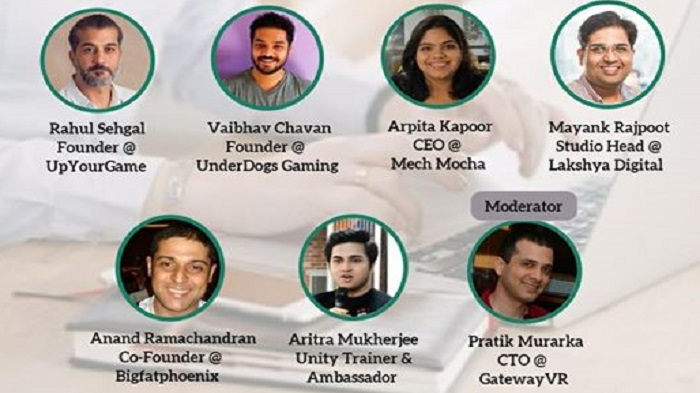Many people believe that they are required to earn a college degree in order to become a video game developer. We cannot completely deny the fact however, that most game developers have a degree in video games design or of a related discipline (like computer science). It is true that a college degree is by far the easiest route into game design, because it gives you opportunity and space to develop both education (in a formal environment), and portfolio. What if one wishes later in life that they want develop games. Will that person have to go through formal learning of game development? There are more and more routes opening up to people who have not been college-educated to get into game development.
Recently IGDC organised a webinar with moderator Gateway VR CTO Pratik Murarka and panelist UpYourGame founder Rahul Sehgal, MechMocha founder Arpita Kapoor, UnderDogs Gaming founder Vaibhav Chavan, Lakshya Digital studio head Mayank Rajpoot, Bigfatphoenix co-founder Anand Ramachandran, Unity ambassador, and trainer Aritra Mukherjee, on A Career Making Games. and have discussed various peripheries of gaming as a career. One of the interesting parts of the session was when experts shared their views on what they see in an individual before hiring them as an employee is it a formal education certificate or something else? Let’s find out :

Rajpoot says “working as a team member is a must while maintaining the output as an individual of course.” Apart from that, they look for challenges to win through them, this is what they expect from people. For hiring they don’t look for any professional degree or qualification and this only for art thing that they cater services for things from the technical side it is essential to look for art background. In the art team they do have people straight from college and have some art background on the other hand they do have people who have professional fine arts degrees at the same time. And even they have people who are from different background and have switched the career in gaming as well.They look for have a genuine interest in arts and games, ability to learn because if they hire someone who is not open to learning then there is a possibility to face challenges in the team.

Kapoor shares when they hire engineers she looks for the “ability to solve the assignments that are given while interviewing, there is nothing to go with from where you have come from or what your college is. As long as you clear the assignments of the hiring process and as long as you clear the bar for our culture and the kind of people we like from a drive or attitude point of view we are open to hiring fresh graduates as well.” For product, they look for an entry-level position as an analyst and what they look for an explorer who can find out core aspects of a game of an app and who can recreate and quantify some of them and how they perceived the app. Ability to work with data, ability to work with game designer, to look at the product and tell the aspect of it. For design, they have hired fresh students who are well versed in UX UI or graphic design. For QA they have hired fresh engineering graduates interested in gaming otherwise experienced from the industry who have past knowledge with game design. Marketing is completely from everywhere who have cleared their assignments.
Ramachandran says “educational qualification is good but not a must. If you are hiring at a senior position skill test, breakdowns and there are other aspects that we have to look if it is about junior position things are slightly different.” The principle search for an employee starts with the mindset to find an individual with genuine intend is essential. This helps to understand the company that one should show interest by doing something and not just approaching bare handed. “ If you are coming without our skill but have the attitude to learn then we are open to hire you and teach you the skill. Another thing that we look at is open mind if you are not open to our ethics, our views then we are not willing to proceed with it,” he added.

Sehgal was a merchant naval officer who earlier, shifted his career into gaming after completing studies from a gaming school in Vancouver. He believes the only way to know how to make games is to make games in real. Only by making games one will understand the format, challenges, hard work that it requires is by going through the practical process . “ I have people who have been to school and kind of ok, I have people who have been to school and have gotten lot from that and are really advancing very fast and I have people who have zero formal education don’t even know how to speak English and they are absolutely rocking it.” He looks for individuals who have a zeal for learning, zeal to push boundaries and aims to do extra these are the people who will leap from where they are right now.
Chavan says his perspective is totally different in terms of team strength because it is a small company, a very small studio with 10 people in which two of them are interns, the composition is four programmers with three artists, two designers and he majorly focuses on business as well as the design and product quality, apart from that lot of work are outsourced. Since it’s a small studio, a lot of time roles are swapped and people do a lot of stuff. For example, if one person is a game designer that person is trying to do prototyping of the games as well, because they also do some sort of hyper-casual games now. If people want to experiment with their skills and do other things side by side are free to do that. “Then you talk about the studies and qualifications I’ll be very open about it, to speak about it, 80 per cent of my teams are undergraduate, they are not at all graduates and I really don’t care about their graduation or qualifications as such, unless and until they are good at what they do. one who has a tremendous amount of knowledge but can not bond with team Vs one who has a passion to be in a team and work and learn stuff but has the lesser skill,I would choose, the second guy and that’s my strategy when I’m trying to hire people and build people.”

Mukherjee shares a lot of passion requires to be in the industry. Since he is a guest lecturer to some schools he introduced a new technique to teach students he chucked out the scoring part of it and initiated a hackathon where students will build games. He noticed that the canceling scoring part of the education have made people more pumped to produce quality.
So practical experience and zeal to learn is the key to join the industry and not the mandatory schooling. Definitely there are technical areas where you require certain technical knowledge but again from where you gain that knowledge doesn’t really matter.
